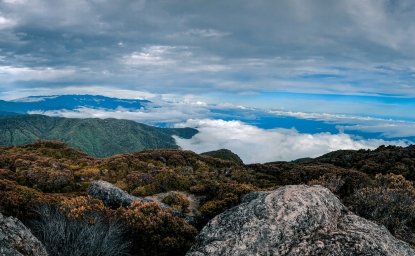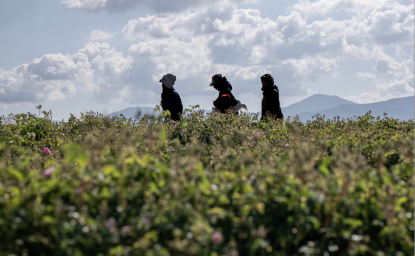Environmental Security Risks in South America
This review provides a summary of the critical risks from a 1.5 to 4 degree Celsius average temperature increase in South American forest and temperate landscapes.
This review provides a summary of the critical risks from a 1.5 to 4 degree Celsius average temperature increase in South American forest and temperate landscapes.

INTRODUCTION
Continental-scale risks from climate change affect both regional communities and country dynamics across the world, with climate models forecasting an average global temperature rise of more than 1.5 degrees Celsius. This rise in global temperatures may increase South American environmental security risks through sea level rise, changing weather patterns, and extreme storms—ultimately influencing the security and health of citizens.
Over the course of the next several decades, impacts to ecosystems from climate destabilization are likely to become significant throughout the Western Hemisphere, diminishing biodiversity and natural resources. The numerous and varied natural environments found within South America, could face loss to ecosystem services or structure as climate change alters fragile ecosystems. These diverse and critical ecosystems include tropical rainforests, temperate deserts, subtropical dry forests and high-mountains.
South American biome environments span multiple countries and support a variety of diverse flora and fauna. The sustainable functioning of each of these natural environments is required to produce clean water, air and food for the population, as well as natural protection from extreme storms and land erosion. Though they are somewhat heterogeneous, a collapse in any of these environments would have resounding impacts to all of the others, as well as the rural and urban populations that rely on them.
The impact to the human population from ecosystem damage could be significant, with the risk of increased migration resulting from food and water shortages. Recognizing the likely impacts of climate change within these diverse environments can give policymakers the opportunity to plan for future scenarios affecting their countries’ food and water security, migration, and natural disaster preparedness.
This review provides a summary of the critical risks from a 1.5 to 4 degree Celsius average temperature increase in South American forest and temperate landscapes. An appreciation of the overall risks to South American countries will allow for the development of intraregional mitigation and conservation strategies. Active environmental planning will help to identify which environmental risks need to be taken into account, to further dialogue on the regional security implications of a changing climate.
ABOUT THE AUTHOR
Dr. Kimberley R. Miner is a Research Assistant Professor at the University of Maine’s Climate Change Institute, focusing on global risks from climate change. In this capacity, she recently managed pollution research on the 2019 National Geographic trip to take ice cores from Mt.
Everest. She is a graduate of Columbia’s School of International and Public Affairs (MPA) and University of Maine’s Climate Change Institute (PhD). She also serves as a Fellow at the Center for Climate and Security in Washington, D.C. and as Co-chair of the NASA Interagency Forum on Climate Risks, Impacts and Adaptation.

The Wilson Center’s prestigious Latin America Program provides non-partisan expertise to a broad community of decision makers in the United States and Latin America on critical policy issues facing the Hemisphere. The Program provides insightful and actionable research for policymakers, private sector leaders, journalists, and public intellectuals in the United States and Latin America. To bridge the gap between scholarship and policy action, it fosters new inquiry, sponsors high-level public and private meetings among multiple stakeholders, and explores policy options to improve outcomes for citizens throughout the Americas. Drawing on the Wilson Center’s strength as the nation’s key non-partisan policy forum, the Program serves as a trusted source of analysis and a vital point of contact between the worlds of scholarship and action. Read more




